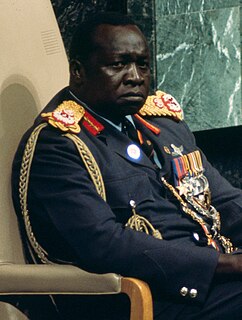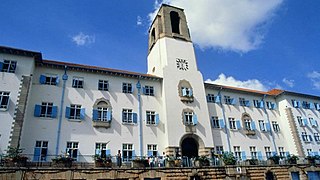
Idi Amin Dada Oumee was a Ugandan military officer and politician who served as the third president of Uganda from 1971 to 1979. He ruled as a military dictator and is considered one of the most brutal despots in modern world history.

The East African Community (EAC) is an intergovernmental organisation composed of seven countries in the Great Lakes region of East Africa: the Democratic Republic of the Congo, the United Republic of Tanzania, the Republics of Kenya, Burundi, Rwanda, South Sudan, and Uganda. Évariste Ndayishimiye, the president of Burundi, is the current EAC chairman. The organisation was founded in 1967, collapsed in 1977, and was revived on 7 July 2000.

Makerere University, Kampala (; Makerere University is Uganda's largest and oldest institution of higher learning, first established as a technical school in 1922. It became an independent national university in 1970. Today, Makerere University is composed of nine colleges and one school offering programmes for about 36,000 undergraduates and 4,000 postgraduates. The main administrative block was gutted by fire in September 2020 and the cause of the fire is yet to be established.

Speciosa Naigaga Wandira Kazibwe, is a Ugandan politician and first female vice president in Africa. She was the sixth vice president of Uganda from 1994 to 2003, making her the first woman in Africa to hold the position of vice-president of a sovereign nation. Dr. Speciosa Kazibwe is also a Ugandan surgeon. She is also referred to as "Nnalongo", because of her twins. In August 2013, she was appointed by the United Nations's Secretary General, Ban Ki-Moon as United Nations Special Envoy for HIV/AIDS in Africa.
The Inter-University Council for East Africa (IUCEA), is an institution of the East African Community, which is a regional intergovernmental organisation of the republics of Kenya, Tanzania, Uganda, Burundi, Rwanda and South Sudan. IUCEA aims to foster collaboration between universities in the EAC region. It has its head offices in Kampala, Uganda

The East African Federation is a proposed political union of the seven sovereign states of the East African Community – Burundi, the Democratic Republic of the Congo, Kenya, Rwanda, South Sudan, Tanzania and Uganda – as a single federated sovereign state. The idea of this Federation has existed since the early 1960s, but has not yet come to fruition for a variety of reasons. In September 2018, a committee was formed to begin the process of drafting a regional constitution, and a draft constitution for the confederation was set to be written by the end of 2021 with its implementation by 2023; however, it is likely that this deadline will be missed.
Esther Mayambala Kisaakye is a Ugandan judge. She is a Justice of the Supreme Court of Uganda. She was appointed to that position in July 2009.

Jennifer Semakula Musisi is a Ugandan lawyer and public administrator. She is the first City Leader in Residence at Bloomberg Harvard City Leadership Initiative at the Ash Center of the Harvard Kennedy School, in Cambridge, Massachusetts, United States. She was appointed to this position in January 2019.
Margaret Nantongo Zziwa is a Ugandan politician and legislator. She served as the Speaker of the 3rd East African Legislative Assembly (EALA) in Arusha, Tanzania. She was elected to serve in that capacity in June 2012. She was impeached and voted out of office on 17 December 2014, on the basis of misconduct and abuse of office, but was later awarded compensation for illegal removal.

Margaret C. "Peg" Snyder was an American social scientist with a special interest in women and economic development, particularly in Africa. She was the founding director of the United Nations Development Fund for Women (UNIFEM), whose name was changed to UN Women in 2011. She was also a co-founder of Women's World Banking and of the African Training and Research Centre for Women.
Fred Mukasa Mbidde is a Ugandan lawyer, human-rights activist, mass communication specialist, motivational speaker and politician. He is an elected member of the 3rd East African Legislative Assembly (EALA), representing the Republic of Uganda. He has been in this office since June 2012. He serves on three EALA committees: the Committee on Communication, Trade and Investments; the Committee on Legal, Rules and Privileges; and the Committee on Regional Affairs and Conflict Resolution. He is the chairperson of the Committee on Communication, Trade and Investments.

The Uganda Women's Network (UWONET) is a Ugandan non-governmental organization (NGO) working to advance public policy regarding women's rights. It is an umbrella organisation of national women's NGOs and individuals operating in East Africa. The executive director is Rita H. Aciro-Lakor.
General elections were held in Kenya on 8 August 2017 to elect the President, members of the National Assembly and Senate. They coincided with the 2017 Kenyan local elections which elected Governors and representatives in the devolved governments.
Science and technology in Uganda examines government efforts to develop a national innovation system and the impact of these policies.
Lillian Tibatemwa-Ekirikubinza is a Ugandan lawyer, academic and judge, who has served as a Justice of the Supreme Court of Uganda, since 2015.
Student activism and politics was a significant part of Ugandan higher education in the 20th century. Beginning in the 1930s, Ugandan universities and secondary schools were a center for revolutionary movement. For three decades, most youth movements focused on independence from the British Empire. Following independence in 1962, activist groups shifted focus internally. Student leadership groups at universities around Uganda, especially Makerere University, were politically affiliated and elections for student government were closely tied to political standing. Student activist groups were key opposition against the regimes of Milton Obote and Idi Amin, and students were especially targeted for persecution during Amin's presidency. During Yoweri Musevini's presidency, students have been leading critics, participating in large protests both preceding and following Musevini's move to eliminate presidential term limits in 2006. Consistent opposition to President Yoweri Musevni culminated in three shutdowns of Makerere University.
Stella Nansikombi Mukasa Makubuya, , was a Ugandan human-rights lawyer, and women's rights activist who served as the Regional Director for Africa at the International Center for Research on Women (ICRW).
Ruth Sebatindira is a Ugandan corporate and tax lawyer who, effective January 2020, is the Administrator of Uganda Telecom Limited, a government-owned telecommunications company, under court administration since April 2017.
Jackie Asiimwe–Mwesige,, is a Ugandan human rights lawyer and philanthropy advisor. She is the current Chairperson of the East African Philanthropy Network (EAPN) and chief executive officer of CivSource Africa, a philanthropy advisory service company that she founded in 2017.
The Uganda Association of Women Lawyers (FIDA-U), established in 1974, is a pioneer of legal aid and public education in sub Saharan Africa. It is a membership based organization which has been an NGO since 1999.






